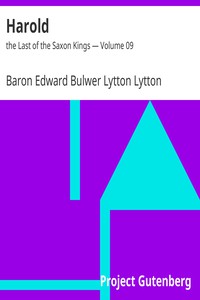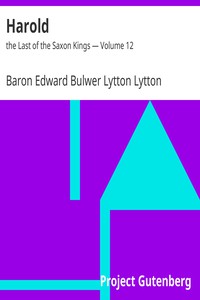Harold : the Last of the Saxon Kings — Complete, Lytton [best e reader for academics .txt] 📗

- Author: Lytton
Book online «Harold : the Last of the Saxon Kings — Complete, Lytton [best e reader for academics .txt] 📗». Author Lytton
“Eno’; you have whetted the beaks of the ravens, and harnessed the steeds of the sea!”
CHAPTER VII.
Meanwhile, King Harold of England had made himself dear to his people, and been true to the fame he had won as Harold the Earl. From the moment of his accession, “he showed himself pious, humble, and affable 227, and omitted no occasions to show any token of bounteous liberality, gentleness, and courteous behaviour.”—“The grievous customs, also, and taxes which his predecessors had raised, he either abolished or diminished; the ordinary wages of his servants and men-of-war he increased, and further showed himself very well bent to all virtue and goodness.” 228
Extracting the pith from these eulogies, it is clear that, as wise statesman no less than as good king, Harold sought to strengthen himself in the three great elements of regal power;—Conciliation of the Church, which had been opposed to his father; The popular affection, on which his sole claim to the crown reposed; And the military force of the land, which had been neglected in the reign of his peaceful predecessor.
To the young Atheling he accorded a respect not before paid to him; and, while investing the descendant of the ancient line with princely state, and endowing him with large domains, his soul, too great for jealousy, sought to give more substantial power to his own most legitimate rival, by tender care and noble counsels,—by efforts to raise a character feeble by nature, and denationalised by foreign rearing. In the same broad and generous policy, Harold encouraged all the merchants from other countries who had settled in England, nor were even such Normans as had escaped the general sentence of banishment on Godwin’s return, disturbed in their possessions. “In brief,” saith the Anglo-Norman chronicler 229, “no man was more prudent in the land, more valiant in arms, in the law more sagacious, in all probity more accomplished:” and “Ever active,” says more mournfully the Saxon writer, “for the good of his country, he spared himself no fatigue by land or by sea.” 230 From this time, Harold’s private life ceased. Love and its charms were no more. The glow of romance had vanished. He was not one man; he was the state, the representative, the incarnation of Saxon England: his sway and the Saxon freedom, to live or fall together!
The soul really grand is only tested in its errors. As we know the true might of the intellect by the rich resources and patient strength with which it redeems a failure, so do we prove the elevation of the soul by its courageous return into light, its instinctive rebound into higher air, after some error that has darkened its vision and soiled its plumes. A spirit less noble and pure than Harold’s, once entering on the dismal world of enchanted superstition, had habituated itself to that nether atmosphere; once misled from hardy truth and healthful reason, it had plunged deeper and deeper into the maze. But, unlike his contemporary, Macbeth, the Man escaped from the lures of the Fiend. Not as Hecate in hell, but as Dian in heaven, did he confront the pale Goddess of Night. Before that hour in which he had deserted the human judgment for the ghostly delusion; before that day in which the brave heart, in its sudden desertion, had humbled his pride—the man, in his nature, was more strong than the god. Now, purified by the flame that had scorched, and more nerved from the fall that had stunned,—that great soul rose sublime through the wrecks of the Past, serene through the clouds of the Future, concentering in its solitude the destinies of Mankind, and strong with instinctive Eternity amidst all the terrors of Time.
King Harold came from York, whither he had gone to cement the new power of Morcar, in Northumbria, and personally to confirm the allegiance of the Anglo-Danes:—King Harold came from York, and in the halls of Westminster he found a monk who awaited him with the messages of William the Norman.
Bare-footed, and serge-garbed, the Norman envoy strode to the Saxon’s chair of state. His form was worn with mortification and fast, and his face was hueless and livid, with the perpetual struggle between zeal and flesh.
“Thus saith William, Count of the Normans,” began Hugues Maigrot, the monk.
“With grief and amaze hath he heard that you, O Harold, his sworn liege-man, have, contrary to oath and to fealty, assumed the crown that belongs to himself. But, confiding in thy conscience, and forgiving a moment’s weakness, he summons thee, mildly and brother-like, to fulfil thy vow. Send thy sister, that he may gave her in marriage to one of his Quens. Give him up the stronghold of Dover; march to thy coast with thine armies to aid him,—thy liege lord,—and secure him the heritage of Edward his cousin. And thou shalt reign at his right-hand, his daughter thy bride, Northumbria thy fief, and the saints thy protectors.”
The King’s lip was firm, though pale, as he answered:
“My young sister, alas! is no more: seven nights after I ascended the throne, she died: her dust in the grave is all I could send to the arms of the bridegroom. I cannot wed the child of thy Count: the wife of Harold sits beside him.” And he pointed to the proud beauty of Aldyth, enthroned under the drapery of gold. “For the vow that I took, I deny it not. But from a vow of compulsion, menaced with unworthy captivity, extorted from my lips by the very need of the land whose freedom had been bound in my chains—from a vow so compelled, Church and conscience absolve me. If the vow of a maiden on whom to bestow but her hand, when unknown to her parents, is judged invalid by the Church, how much more invalid the oath that would bestow on a stranger the fates of a nation 231, against its knowledge, and unconsulting its laws! This royalty of England hath ever rested on the will of the people, declared through its chiefs in their solemn assembly. They alone who could bestow it, have bestowed it on me:—I have no power to resign it to another—and were I in my grave, the trust of the crown would not pass to the Norman, but return to the Saxon people.”
“Is this, then, thy answer, unhappy son?” said the monk, with a sullen and gloomy aspect.
“Such is my answer.”
“Then, sorrowing for thee, I utter the words of William. ‘With sword and with mail will he come to punish the perjurer: and by the aid of St. Michael, archangel of war, he will conquer his own.’ Amen.”
“By sea and by land, with sword and with mail, will we meet the invader,” answered the King, with a flashing eye. “Thou hast said:—so depart.”
The monk turned and withdrew.
“Let the priest’s insolence chafe thee not, sweet lord,” said Aldyth. “For the vow which thou mightest take as subject, what matters it now thou art king?”
Harold made no answer to Aldyth, but turned to his Chamberlain, who stood behind his throne chair.
“Are my brothers





Comments (0)